Bokashi Organic Fertilizer
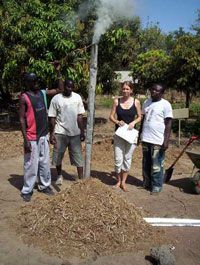 |
| A key component of sustainable organic farming in the developing world is the use of locally produced and low cost biomass resources to rebuild and maintain soil productivity |
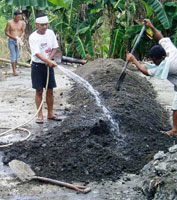 |
| The Bokashi organic soil amendment has proved extremely useful for reducing chemical fertilizer use, beginning the soil rehabilitation process on farms and initiating the conversion to organic agriculture. |
Practical advantages associated with the use of Bokashi include the rapid preparation time (only 2-4 weeks) relative to traditional compost (6 months) and the reduced cost compared to commercial fertilizers because it is manufactured from low-cost, locally available materials. Moreover, it is easily substituted for chemical fertilizers without requiring much additional training. As such, it is an appropriate tool for farmers who are in the process of making the transition from conventional to organic or more ecological agriculture. Farm-produced organic fertilizer can also contribute to long-term food security, rural employment, and farm income generation.
In agroecosystems where soil organic matter has been depleted following years of intensive farming using chemical fertilizers, there may be poor soil structure and a depleted pool of beneficial soil microorganisms. The past use of chemical insecticides, fungicides and herbicides may also have had detrimental impacts on the community of soil microorganisms. As such, the first years of organic or ecological cultivation are frequently characterized by lower yields and reduced farm income until the soil has been restored, which generally takes from 3-5 years.
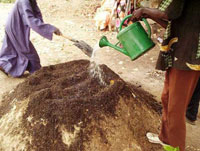 |
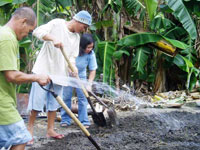 |
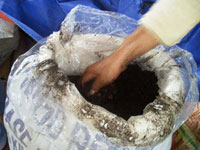 |
This is a particularly serious concern on small-scale farms whose primary function is to provide for the nutritional needs of a family. Funds are not always available to supplement nutritional shortfalls from yield decreases during this transition time (or during times of prohibitively high chemical fertilizer costs). It is therefore important to accelerate the restoration of the soil so as to make the conversion to sustainable agriculture feasible for small landowners by reducing the associated risk.
The simplified process of manufacturing Bokashi organic fertilizer is overviewed with the following steps:
- Collection of Indigenous Microorganisms (IMO) and preparation of "Fermented Plant Juice" (FPJ) by adding bran, plant residues, young fruits, and sugars (brown sugar, molasses, etc.);
- Production of Carbonized Rice Hull (CRH) or other carbonized agri-residue material (i.e. millet hull);
- Combining IMO, FPJ, CRH, soil rice bran and animal manure with water, checking and mixing every day for 2-4 weeks.
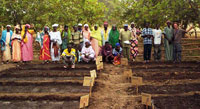
|
The use of IMO and Bokashi can restore the microbial community in degraded agroecosystems and improve overall crop productivity. An increased diversity and activity of beneficial microorganisms in the soil can stimulate decomposition processes, providing a constant supply of nutrients from soil organic matter, enhancing nutrient cycling and increasing nutrient uptake by plants. Beneficial fungal species can also colonize individual plant roots and stimulate increased nutrient uptake, which in turn improves plant size and yield. Research with peanut crops has shown that crops treated with Bokashi fertilizer had higher growth rates, increased nodulation and higher yield than crops treated with chemical fertilizer. The use of Bokashi has also been noted to improve drought tolerance in crops such as corn. Beneficial microorganisms can also limit the growth of pathogenic fungi and bacteria, and suppress of disease and insect attacks by stimulating the increased production of plants natural defenses.
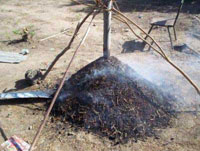
|
Chemical fertilizers have historically contributed as much as 55% of the increase in food production in developing countries. However, the synthesis, manufacture, transport, hauling and distribution of chemical fertilizers utilize fossil fuels. Thus, as oil prices increase, the price of chemical fertilizers also increases. A long-term increase in the price of chemical fertilizers can not be avoided and a negative impact on agricultural crop production is certain unless cheaper alternative sources of nutrients are made available to farmers.
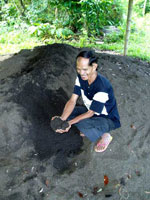
|
For more detailed information and the step-by-step Bokashi production instructions, please refer to the Nature Farming and Bokashi Manual in REAP's on-line library.




